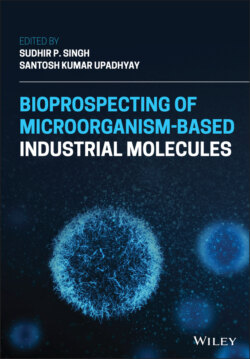Читать книгу Bioprospecting of Microorganism-Based Industrial Molecules - Группа авторов - Страница 22
2.2 Biosynthesis of BS by Archaea and Bacteria
ОглавлениеThere are few papers related to Archaea as BS producers, compared to bacteria. Those who have been studied are alkaliphiles from the marine environment [20]. In contrast, bacteria produce mainly glycolipids, such as rhamnolipids, trehalolipids, and glucolipids; biosynthesis is restricted to actinobacteria, proteobacteria, cyanobacteria, and firmicutes (87%), other phyla represent between 1.0 and 2.5% of glycolipid‐producing bacteria [21]. On the other hand, lactic acid bacteria (LAB), produce BS showing important roles in LAB colonization due to antimicrobial activities against fungi and bacteria. LAB BS are constituted by polysaccharides, glycolipids, glycolipopeptides, and proteins [22, 23]. Figure 2.5 depicts the distribution of prokaryote‐producing BS. A broad review of scientific literature proved that prokaryotes are the predominant group of microorganisms related to BS production (Table 2.2), particularly bacteria.
Figure 2.5 Phyla of prokaryote producers of biosurfactants.
Source: Sharma et al. [22] and Satpute et al. [23].
Table 2.2 Archaea and bacteria as biosurfactant producers.
| Biosurfactant | Microorganism | Carbon source | |
|---|---|---|---|
| Rhamnolipids | Pseudomonas aeruginosa | Oil residues, corn oil, waste frying oil [24–26] | |
| Pseudomonas fluorescens | Hexadecane, olive oil [26] | ||
| Pseudomonas luteola | Molasses [26] | ||
| Pseudomonas chlororaphis | Glucose [26] | ||
| Pseudomonas putida | Molasses, glucose [26] | ||
| Pseudomonas stutzeri | Palm oil mill effluent [27] | ||
| Pseudomonas pachastrellae | Barley pulp [28] | ||
| Pseudomonas desmolyticum | Hexadecane [29] | ||
| Burkholderia glumae | Canola oil [26] | ||
| Burkholderia plantarii | Glucose [26] | ||
| Burkholderia pseudomallei | Glycerol [26] | ||
| Burkholderia thailandensis | Canola oil, glycerol [26] | ||
| Bacillus pumilus | Crude oil and naphthalene [30] | ||
| Nocardioides sp | n‐paraffin [31] | ||
| Serratia rubidaea SNAU02 | Mahua oil cake [32] | ||
| Acinetobacter calcoaceticus | Glycerol [26] | ||
| Acinetobacter junii | Soybean oil [33] | ||
| Enterobacter asburiae | Sodium citrate [34] | ||
| Enterobacter hormaechei | Glycerol [26] | ||
| Achromobacter sp. | Lignocellulosic residues [35] | ||
| Pantoea stewartii | Glycerol [26] | ||
| Pseudoxanthomonas sp. | Mannitol [26] | ||
| Renibacterium salmonarium | n‐hexadecane [36] | ||
| Streptomyces sp. | Glucose [37] | ||
| Streptomyces coelicoflavus | Olive oil [38] | ||
| Tetragenococcus koreensis | GYP [39] | ||
| Thermus aquaticus | Sunflower oil [26] | ||
| Trehalolipids | Rhodococcus erythropolis | n‐hexadecane [40] | |
| Rhodococcus sp. PML026 | Sunflower oil [41] | ||
| Rhodococcus fascians | n‐alkanes [42] | ||
| Rhodococcus opacus | n‐alkanes [42] | ||
| Rhodococcus wratislaviensis | n‐hexadecane [42] | ||
| Rhodococcus ruber | n‐hexadecane [43] | ||
| Corynebacterium matruchotii | [42] | ||
| Arthrobacter parafineus | n‐paraffin [42] | ||
| Arthrobacter sp. | Crude oil degrading [42] | ||
| Micrococcus luteus | n‐hexadecane [44] | ||
| Tsukamurella spumae | Sunflower oil [45] | ||
| Tsukamurella pseudospumae | Sunflower oil [45] | ||
| Rhodococcus qingshengii | n‐hexadecane [46] | ||
| Other glycolipids | Deinococcus caeni PO5 | Jackfruit seed poder [47] | |
| Brachybacterium paraconglomeratum MSA2 | Oil seed cake, wheat bran, treated molasses [47] | ||
| Halomonas sp. | Glucose [48] | ||
| Pseudomonas otitidis | Sodium acetate [49] | ||
| Phospholipids | Corynebacterium lepus | [50] | |
| Lipopeptides | Bacillus licheniformes | Glucose [51] | |
| Bacillus subtilis | Motor oil [52] | ||
| Bacillus thuringiensis | Glycerol [53] | ||
| Klebsiella sp. | Crude oil [39] | ||
| Aeromonas salmonicida | Gasoline [54] | ||
| Polymixin | Paenibacillus polymixa | Glucose [55] | |
| Surfactin | Bacillus subtilis | Glucose, glycerol [55, 56] | |
| Fengycin | Bacillus subtilis | Glucose [57] | |
| Pontifactin | Pontibacter korlensis | Glucose [58] | |
| Serrawetin | S. surfactantfaciens | [59] | |
| N.A. | Lactococcus lactis | Cheese whey [60] | |
| Streptococcus termophilus | Sucrose and lactose [60] | ||
| Lactobacillus acidophilus | [61] | ||
| Protein, polysaccharides | Lactobacillus pentosus | Cheese whey [62] |
